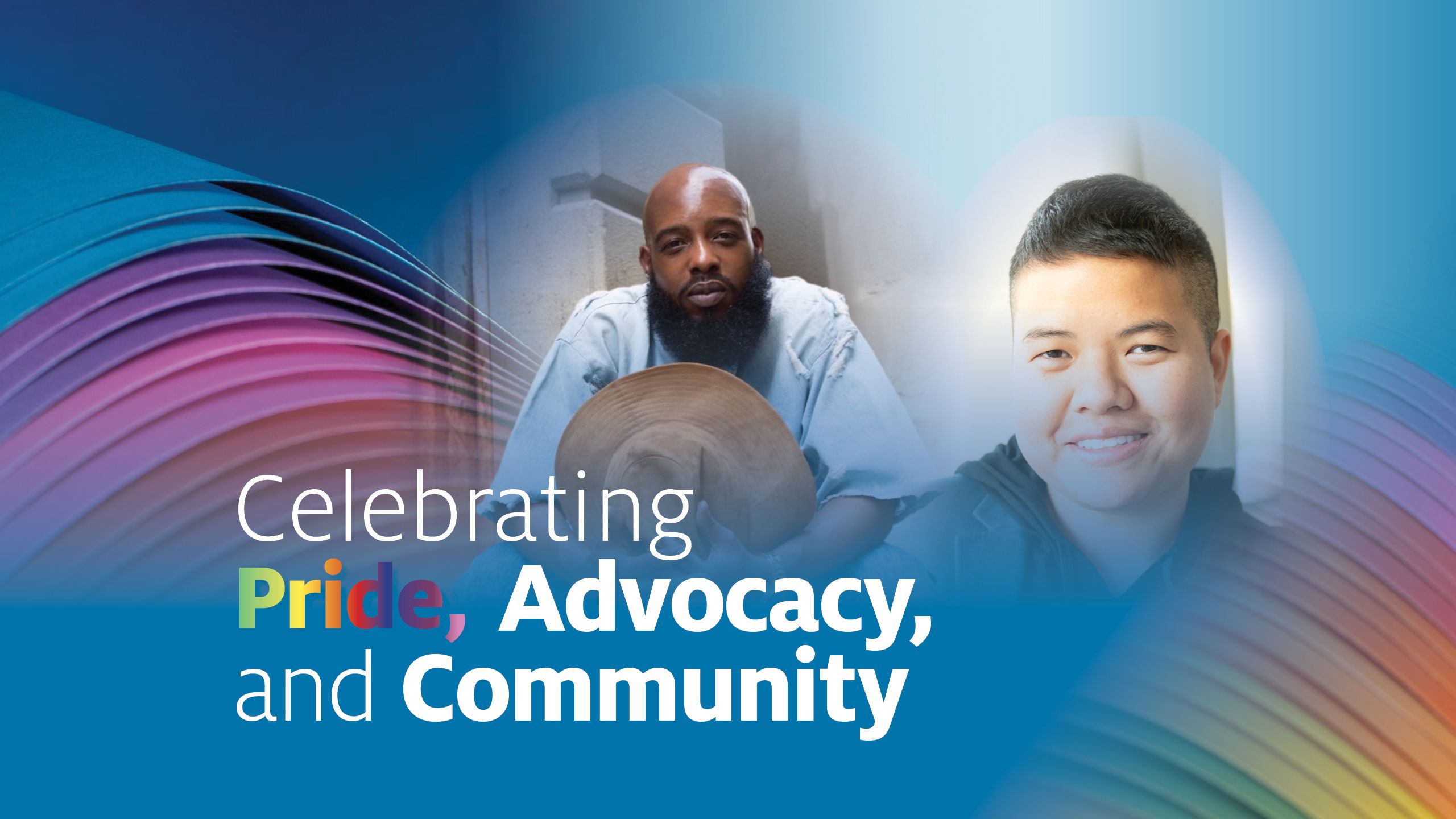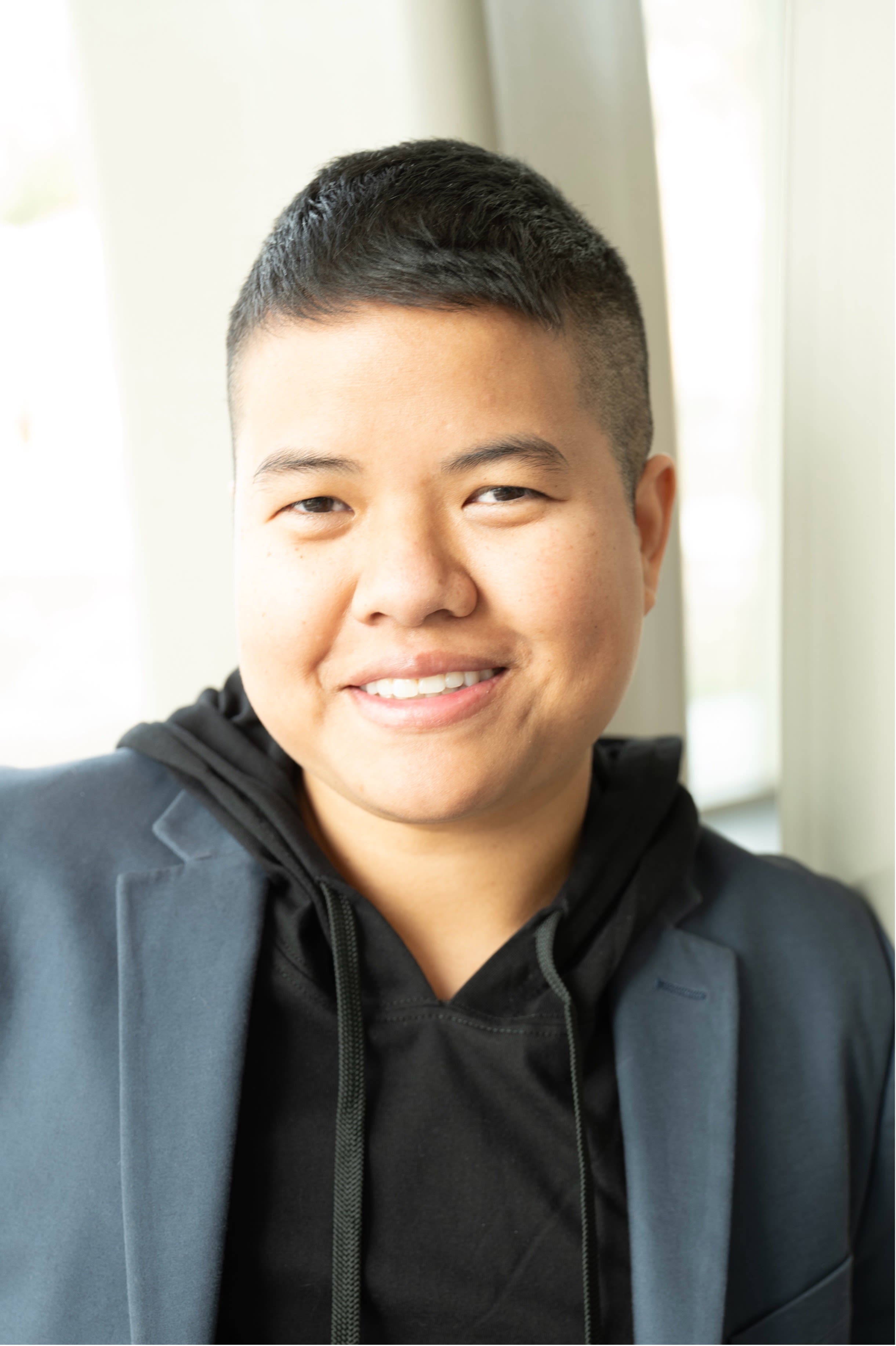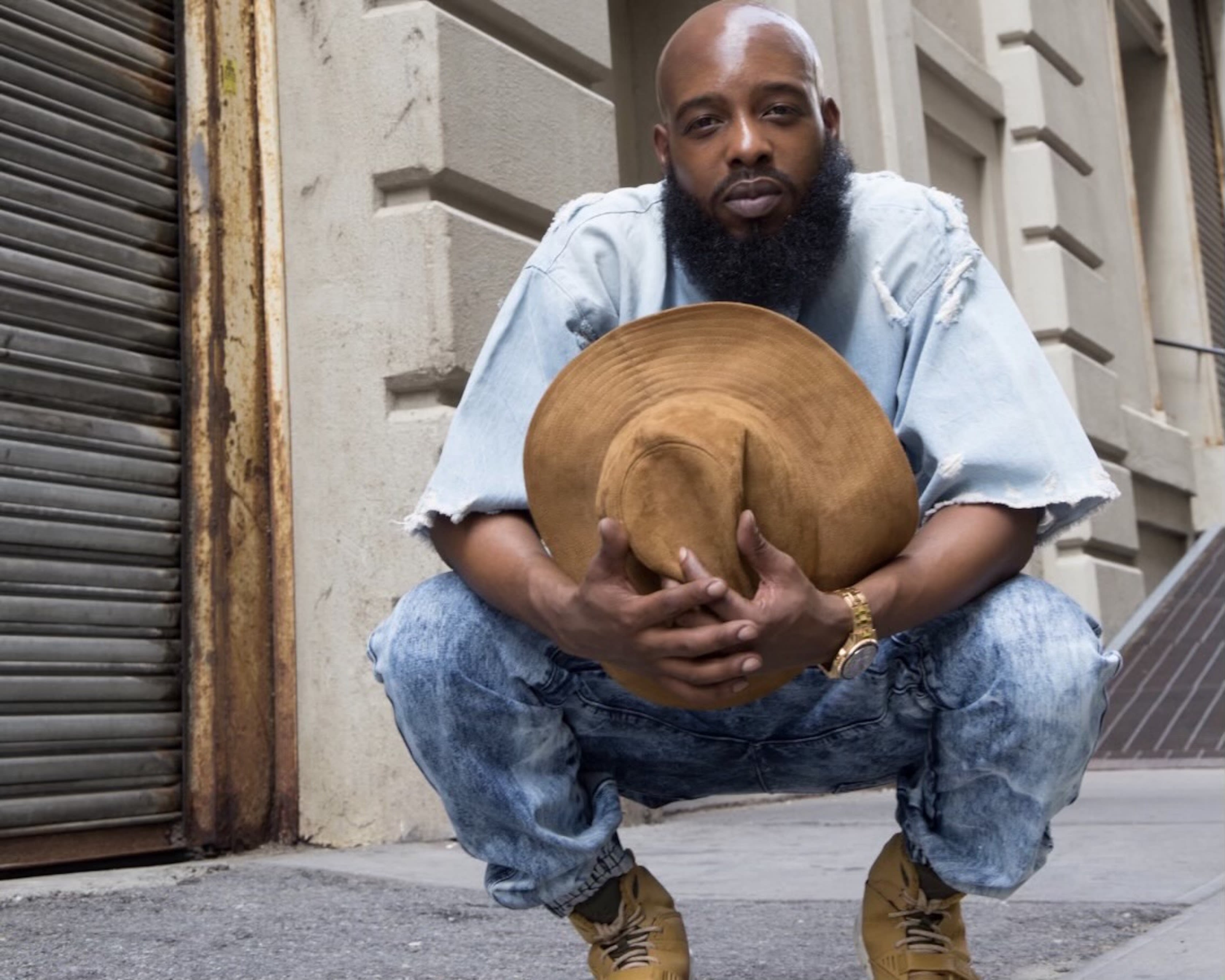
The SUSTAIN Wellbeing COMPASS Coordinating Center at the University of Houston Graduate College of Social Work is a vital hub in the fight against HIV/AIDS in the South. As one of four COMPASS Coordinating Centers, it focuses on mental health, trauma-informed care, substance use (especially harm reduction and the opioid epidemic), telehealth, and wellness in the context of HIV/AIDS. As Pride Month comes to a close, we celebrate our programs and staff members who dedicate themselves to the ongoing struggle for liberation, equality, and acceptance.
During a recent interview, SUSTAIN Wellbeing COMPASS Coordinating Center team members Dr. Bec Sokha Keo and Marcus Stanley shared their thoughts on pride and advocacy, community and collaboration, and the future work of the program and the communities they serve.

Dr. Bec Sokha Keo, Research Associate II for the SUSTAIN Wellbeing COMPASS Coordinating Center. (photo courtesy Sean Black)
Dr. Bec Sokha Keo, Research Associate II for the SUSTAIN Wellbeing COMPASS Coordinating Center. (photo courtesy Sean Black)
Dr. Bec Sokha Keo, Research Associate II for the SUSTAIN Wellbeing COMPASS Coordinating Center, works at the forefront of this mission in collaboration with colleagues and community constituencies. They focus on research, public impact scholarship, and programming, leading community-based participatory action research, developing the Center’s public impact infrastructure, and collaborating with UHCL and Tecolotl, a local Language Justice Collective on the ACTION Language Justice Grant, Training, & Coaching opportunity. Read how Dr. Bec Sokha Keo's leadership is empowering communities of color impacted by HIV and Aids in Outsmart Magazine (May 2024).

Marcus A. Stanley, MPH, MCHES®, Project Officer and Director of Programs 2, SUSTAIN Wellbeing COMPASS Coordinating Center (photo courtesy M. Jones Imaging)
Marcus A. Stanley, MPH, MCHES®, Project Officer and Director of Programs 2, SUSTAIN Wellbeing COMPASS Coordinating Center (photo courtesy M. Jones Imaging)
Marcus A. Stanley, MPH, MCHES®, Project Officer and Director of Programs 2, is an influential SUSTAIN Wellbeing COMPASS Coordinating Center member. His journey spans over 20 years, during which he has tirelessly served underrepresented and racially minoritized communities, both locally and nationally, with a particular focus on HIV. Marcus’ career is a testament to his dedication to capacity-building, training, and consultations. He has worked with a diverse range of organizations and individuals, championing trauma-informed care and advocating for the dismantling of white supremacy work culture to foster healing within organizations. During a recent interview, Marcus shared his thoughts on pride and advocacy, community and collaboration, and his thoughts on the future work of the program and the community he serves.
Pride & Advocacy

"Pride is about liberation!"
Q: What does Pride Month mean to you and what are your hopes for the future of the community you serve?
Dr. Bec Sokha Keo: Pride is rooted in resistance by Black and brown queer, trans, and gender non-conforming people. I hope that the broader community continues to honor these rootsand works in solidarity to resist and dismantle those same systems that still exist and oppress our most systematically impacted community members today. Pride is also about liberation. Black and brown trans, non-binary, and gender non-conforming people should be able to live the lives they dream of. I hope we all (allies and accomplices) work together to build our communities around the hopes and dreams of Black and brown queer and trans people.
Marcus A. Stanley: Pride Month is a time to celebrate the progress made, remember the hardships endured, and acknowledge the work that still needs to be done. For me, it's a reminder of my commitment to serving underrepresented and racially minoritized communities.
My hope for the future is to see a world where everyone, regardless of their race, sexual orientation, or HIV status, is treated with dignity and respect. I envision a society where health disparities are eliminated and access to quality healthcare is a right, not a privilege. I am dedicated to making this vision a reality by continuing to serve my communities, advocating for their needs, and working towards a future free from discrimination and health inequities.
Q: In what ways has your role with SUSTAIN Wellbeing COMPASS Coordinating Center allowed you to better advocate for those affected by HIV/AIDS?
Marcus A. Stanley: In my role, I have been able to advocate more effectively for those affected and disproportionately impacted by HIV/AIDS. I am part of an initiative that focuses on the Southern United States, where 54% of all new HIV diagnoses occur, directly addressing the region most impacted by the epidemic. Through the Gilead COMPASS InitiativeⓇ, I am involved in a concentrated effort to reduce HIV-related health disparities in the South.
I build awareness about HIV/AIDS, advance education, reduce the stigma associated with the disease, and work with organizations to include sustainable trauma-informed changes. SUSTAIN's focus is on mental health, trauma-informed care, telehealth, harm reduction practices, and overall wellness and well-being to promote a holistic approach to HIV/AIDS care. I help empower local organizations to address the epidemic more effectively by leading and assisting in capacity-building and shared learning opportunities.
I value data-driven programming, ensuring advocacy efforts are informed by solid evidence and continuously improved. By implementing programming through grants provided to local organizations committed to addressing the epidemic in the South, I support community-led, culturally sensitive, sustainable, grassroots initiatives.
Guided by five overarching principles (Meaningful Involvement of People Living with HIV/AIDS (MIPA), Intersectionality, Emphasizing Racial and Social Justice, Openness, Transparency, and Learning, collaboration, and Commitment, and a Wholistic Approach), my advocacy efforts are comprehensive, inclusive, community-focused, innovative, and sustainable. Through my role with SUSTAIN, I make a significant contribution toward advocating for individuals most impacted by HIV/AIDS.
Community & Collaboration

“If you build it, they will come, but if you build it with them, they will stay.”
Q: What role does community involvement and support play in the work that the SUSTAIN Wellbeing COMPASS Coordinating Center does?
Marcus A. Stanley: Community involvement is crucial and the epicenter of the SUSTAIN Center's work. I coordinate with the Programs, HR, organizations, and Finance Departments to carry out all aspects of programs. I serve as the primary liaison for site project technical units and work closely with partner organizations to coordinate activities against implementation work plans. It is a three-way partnership between us, the organization, and the populations served.
Q: Can you discuss any partnerships or collaborations with other organizations that have enhanced your ability to address HIV/AIDS in the South?
Dr. Bec Sokha Keo: I am proud to share that the research project I lead is in partnership with The Normal Anomaly, a local Black queer and trans-led organization that works to address intersectional challenges that Black queer and trans people face, including HIV. Our research study focuses on Black trans women’s access to affirming services in the Greater Houston Area. The Normal Anomaly’s Trans Ally Collective of Black Trans Women are part of all phases of the research process and are compensated for their time, expertise, wisdom, and labor.
Marcus A. Stanley: I have worked with Emory University Rollins School of Public Health, University of Houston Graduate College of Social Work, Wake Forest School of Divinity, the Southern AIDS Coalition, GLAAD, Precision, Tecolotl, ETR, AIDS United, Gilead Sciences, Ribbon, Black Power, Liberation and Healing Now (BPLHN), and Legacy Leadership Consulting (to name a few) through the Gilead COMPASS Initiative®. These partnerships have been instrumental in implementing culturally responsive HIV-related programming and providing funding to local organizations committed to addressing the epidemic throughout the South.
Q: How do you ensure that the voices of individuals living with HIV/AIDS are included in the development and implementation of your programs?
A: Dr. Bec Sokha Keo: I credit the SUSTAIN Center, Community Based, and HIV Service Organizations for teaching and modeling how to meaningfully involve people living with HIV (MIPA) in programs and research projects. It begins with involving the community at the forefront, not as an afterthought. Meaningful involvement looks like sharing power. Some examples include: 1) having community members in decision-making positions at your organization, 2) investing in the leadership development and expansion of community members living with and most systematically impacted by HIV, 3) valuing lived experience as much as (if not more than) credentialed experience, 4) compensating community members for their labor (not with gift cards); and 5) hiring community members most systematically impacted with opportunities and support to advance and expand in their role.
Marcus A. Stanley: As I always say, “If you build it, they will come, but if you build it with them, they will stay.” MIPA is the pillar of our guiding principles. The inclusion of individuals living with HIV/AIDS in the development and implementation of programs was embedded in the pre-conception of this project. We established collaborative relationships with organizations, allies, advocates, those living with and most impacted by HIV, implementing partners, compliance, finance, and M&E teams before applying for the grant, ensuring successful project implementation, trust establishment, and compliance.
Q: What are some of the biggest challenges you foresee in the coming years regarding HIV/AIDS care in the South, and how is the SUSTAIN Wellbeing COMPASS Coordinating Center preparing to address them?
Marcus A. Stanley: I foresee several significant challenges regarding HIV/AIDS care in the South in the coming years. Stigma and discrimination associated with HIV/AIDS could continue to deter individuals from seeking testing, treatment, and support. Access to care can be limited in the South’s large rural areas, making it difficult for individuals to receive regular care and treatment. Socioeconomic factors such as poverty, lack of education, and inadequate housing, prevalent in some parts of the South, can contribute to higher rates of HIV transmission and make it more challenging to manage the disease. Additionally, co-occurring health conditions like mental health disorders and substance use can complicate HIV/AIDS care.
At the SUSTAIN Center, we are preparing to address these challenges by working to reduce the stigma associated with HIV/AIDS through awareness campaigns, education, and capacity-building for HIV/AIDS care and services in the South. Additionally, we hope to continue to provide grants to organizations. Our focus on mental health, trauma-informed care, harm reduction practices, wellness and wellbeing, and data-driven approaches allow us to take a comprehensive and collaborative approach to addressing HIV/AIDS care and continuously improve our programs and strategies. Through partnerships with other organizations and institutions, we leverage additional resources and expertise to address the HIV/AIDS epidemic in the South. These strategies position us at the SUSTAIN Center to effectively address the challenges of HIV/AIDS care in the South in the coming years.
Looking Forward

Q: What future initiatives or projects are you most excited about at the SUSTAIN Wellbeing COMPASS Coordinating Center, and how do you hope they will impact the HIV/AIDS epidemic in the South?
Marcus A. Stanley: I am particularly excited about several future initiatives and projects at the SUSTAIN Center. I am eager to expand our capacity-building programs to strengthen local organizations in the South working on the front lines of the HIV/AIDS epidemic. By providing these organizations with the necessary resources and training, we can help them offer better care for individuals living with HIV/AIDS and implement effective prevention strategies.
We plan to increase our focus on mental health and trauma-informed care, recognizing that many individuals most impacted by HIV/AIDS struggle with mental health issues and significant trauma. By addressing these issues alongside HIV/AIDS care, we can provide a more wholistic approach to health and well-being.
I am enthusiastic about our ongoing efforts to reduce the stigma associated with HIV/AIDS. Stigma is a major barrier to testing and treatment and significantly impacts the mental health of individuals living with HIV/AIDS. We are planning awareness campaigns and educational and training programs to reduce stigma and promote understanding and acceptance.
My hope is that these initiatives will have a significant impact on the HIV/AIDS epidemic in the South. By strengthening local organizations, we can improve access to care and ensure that individuals living with HIV/AIDS receive the support they need. Our focus on mental health and trauma-informed care will allow us to address the complex needs of these individuals and improve their quality of life. By reducing stigma, we can encourage more people to get tested and treated for HIV/AIDS, which is crucial for controlling the epidemic. I am excited to be part of these efforts and look forward to seeing the positive changes they will bring.
Q: Can you share a particularly memorable experience or story that illustrates the impact of the SUSTAIN Wellbeing COMPASS Coordinating Center’s work?
Marcus A. Stanley: Imagine a young man named “John” (not the real name) living in a rural area of the Southern United States. When John was diagnosed with HIV, he faced significant challenges. The stigma associated with HIV/AIDS in his community made him feel isolated and afraid to seek help. Additionally, the nearest healthcare facility was miles away, making regular treatment difficult.
John's life began to change when he encountered a local organization that had received training and funding through the SUSTAIN Center. This organization provided John with access to the care he needed right in his community. They offered him not just medical treatment but also mental health and social services support, trauma-informed care, and, most of all, a place to feel safe and of community. With their help, John realized he was not alone and that with the right care, he could manage his condition and live a healthy life.
The organization didn't stop there; they worked tirelessly to reduce the stigma of HIV/AIDS in John's community. They held awareness campaigns and educational programs, helping the community understand that HIV/AIDS is a medical condition, not a moral failing. Over time, attitudes began to change, and John felt less isolated. The community started to come together, supporting those impacted by HIV/AIDS and fostering a more inclusive environment. John found hope and a sense of belonging through the collective efforts of the SUSTAIN Center and the local organization.
This is just one of the many examples of how the SUSTAIN Center's work has profoundly impacted individuals and communities affected by HIV/AIDS in the South. By providing resources and support to local organizations, the SUSTAIN Center is making a significant difference in the lives of those impacted by HIV/AIDS.
Q: What motivates you personally to work in this field, and what gives you hope for the future of HIV/AIDS care in the South?
Marcus A. Stanley: My deeply rooted desire to make a difference in the lives of those most impacted by this disease motivates me to work in the field of HIV. HIV/AIDS is more than just a medical condition; it's a global issue that intersects with social, economic, and human rights aspects. The opportunity to contribute to reducing the stigma associated with HIV, improving access to care, and ultimately changing the course of the epidemic is incredibly rewarding.
The resilience and strength of individuals living with HIV are truly inspiring. I am committed to advocating for their needs and rights. The field constantly evolves with new research and advancements, and being part of that progress is exciting and fulfilling. Ultimately, the potential to impact individual lives and communities on a broader scale fuels my passion for this work.
Click here to learn more about the UH SUSTAIN Wellbeing COMPASS Coordinating Center. For more information about MIPA, check out these resources from the US PLHIV Caucus and AIDS United.
